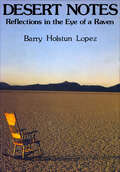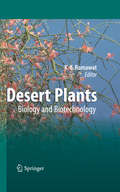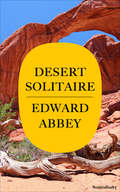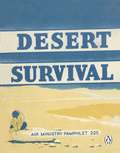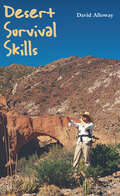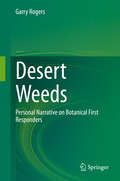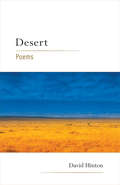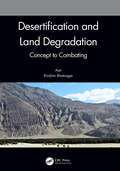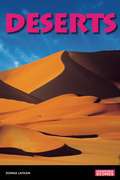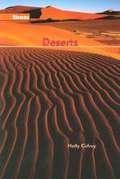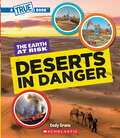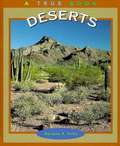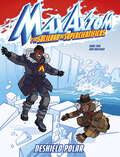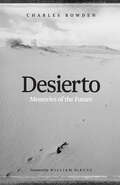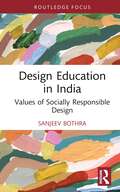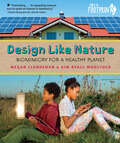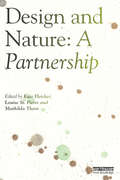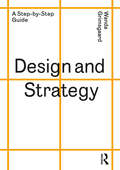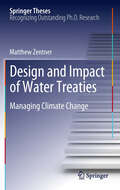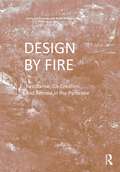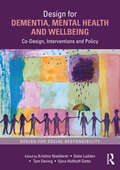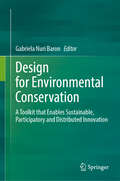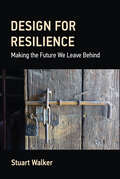- Table View
- List View
Desert Notes: Reflections in the Eye of a Raven
by Barry Holstun LopezA freelance writer and photographer invites the reader to walk with him through the desert where life is clear and elemental.
Desert Plants
by Kishan Gopal RamawatVast areas of Earth's landmass exist as deserts, representing quite distinct ecosystems. Desert plants and animals have evolved specialised survival strategies to cope with the harsh environment of high temperatures and scarce water resources. The life-supporting vegetation of deserts is characterised by its unique reproductive biology, metabolism and adaptive characters. Plants like Prosopis cineraria and date palm form the basis of the rural economy in many countries, and are of great cultural importance; Jojoba and Jatropha have attracted interest as non-conventional sources of industrial oil and biodiesel. This book includes chapters on the seed biology, reproduction, mycorrhizae, stress physiology, and metabolism of desert plants, and describes current biotechnological approaches to their cultivation. It will be useful to researchers, teachers and students in the fields of plant sciences, agriculture, and forestry, and those involved in the management and conservation of desert ecosystems.
Desert Solitaire: A Season In The Wilderness
by Edward AbbeyThis memoir of life in the American desert by the author of The Monkey Wrench Gang is a nature writing classic on par with Rachel Carson&’s Silent Spring. In Desert Solitaire, Edward Abbey recounts his many escapades, adventures, and epiphanies as an Arches National Park ranger outside Moab, Utah. Brimming with arresting insights, impassioned arguments for wilderness conservation, and a raconteur&’s wit, it is one of Abbey&’s most critically acclaimed works. Through stories and philosophical musings, Abbey reflects on the condition of our remaining wilderness, the future of a civilization, and his own internal struggle with morality. As the world continues its rapid development, Abbey&’s cry to maintain the natural beauty of the West remains just as relevant today as when this book first appeared in 1968.
Desert Survival (Air Ministry Survival Guide #3)
by A.M. Pamphlet 225THE ULTIMATE SURVIVAL GUIDE for anyone who thinks they'd survive the world's most hostile environments - or at least imagine they could do.-----------------------------First issued to airmen in the 1950s, the Air Ministry's Sea Survival guide includes original and authentic emergency advice to crew operating over the ocean. With original illustrations and text, these survival guides provide an insight to military survival techniques from a by-gone era.Packed with original line drawings and instruction in:- How to find water in a dry stream course- How to make a hat out of seat cushions- What to do in the event of meeting 'hostile parties'Focussing on one of the most unforgiving environments on Earth, Desert Survival is one of four reprints of The Air Ministry's emergency survival pamphlets. Others include:· Jungle Survival· Sea Survival· Arctic Survival
Desert Survival Skills
by David AllowayAn &“authoritative, comprehensive, well written, and entertaining&” guide to staying alive in the desert from a Texas Parks and Wildlife veteran (Library Journal). Remote desert locations, including the Chihuahuan Desert of northern Mexico, southern Texas, New Mexico, and Arizona, draw adventurers of all kinds, from the highly skilled and well prepared to urban cowboys who couldn&’t lead themselves, much less a horse, to water. David Alloway&’s goal in this book is to help all of them survive when circumstances beyond their control strand them in the desert environment. In simple, friendly language, enlivened with humor and stories from his own extensive experience, Alloway—a naturalist and search-and-rescue veteran who&’s worked with the US Air Force on survival skills—here offers a practical, comprehensive handbook for both short-term and long-term survival in the Chihuahuan and other North American deserts.
Desert Survival Skills
by David AllowayAn &“authoritative, comprehensive, well written, and entertaining&” guide to staying alive in the desert from a Texas Parks and Wildlife veteran (Library Journal). Remote desert locations, including the Chihuahuan Desert of northern Mexico, southern Texas, New Mexico, and Arizona, draw adventurers of all kinds, from the highly skilled and well prepared to urban cowboys who couldn&’t lead themselves, much less a horse, to water. David Alloway&’s goal in this book is to help all of them survive when circumstances beyond their control strand them in the desert environment. In simple, friendly language, enlivened with humor and stories from his own extensive experience, Alloway—a naturalist and search-and-rescue veteran who&’s worked with the US Air Force on survival skills—here offers a practical, comprehensive handbook for both short-term and long-term survival in the Chihuahuan and other North American deserts.
Desert Weeds: Personal Narrative on Botanical First Responders
by Garry RogersIn their rapid colonization of soil exposed by fires, floods, and grazing animals, weeds resemble the human specialists we label Emergency Medical Technicians (EMTs). Weeds are the first responders when disasters occur in nature. They occupy bare soil and prevent erosion by wind and water. In extreme cases such as a landslide, weeds are essential to the healing processes that replace the lost soil. Like a Band-Aid on a skinned knee, weeds protect the land while it recovers. Besides protecting the soil after disaster, weeds provide food for wildlife, and some of them provide food and medicine for people. Able to withstand harsh conditions, weeds will proliferate as global warming and other human impacts intensify. Thus, nature’s EMTs will increase while all other plants decline. The book provides a succinct definition of weeds according to their form and function in ecosystem processes. The narrative uses a representative set of weed species from a desert location to illustrate the full range of weed characteristics.
Desert: Poems
by David HintonThe first collection of original poetry by the renowned nature writer and highly lauded translator of the Chinese classics.Traveling today I found a river somewhere inside me, wondered how far it wanders there and how much sky it mirrors. All day long, wind and desert light, I followed that river’s distances . . . Weaving mind and landscape together in meditations on sky and wind, ridgeline and horizon, existence and self, Desert marks David Hinton’s first collection of original poetry in over a decade. Hinton’s poetic art has long shined brilliantly through his widely acclaimed Chinese translations—and here speaks for itself in his contemporary voice as he turns his attention to the transcendent landscape of the American West. Updating the philosophical insights of ancient China that Hinton has explored so deeply, these poems bring the wonder and ancient mystery of the desert landscape to light. Hinton demonstrated in The Wilds of Poetry how those ancient Chinese insights shaped the innovative American poetry of our time, and here he extends that tradition in poems that are spare and spacious, as vast and open as the desert itself.
Desertification and Land Degradation: Concept to Combating
by Ajai Rimjhim BhatnagarDesertification and land degradation are complex phenomena, and we need to understand their causes, consequences, and means to mitigate and combat their impact. Therefore, this book aims to explain the concept and characteristics of drylands, desert and desertification, land degradation, wastelands, and the concept of ecosystem services. It also discusses various types of processes of land degradations, their characteristics, physics and indicators along with mapping, monitoring and assessment of methods involved. Concept of Ocean Biological Deserts is discussed along with international and regional efforts towards combating land degradation and desertification. Key Features:• Provides all the aspect of desertification and land degradation at one place • Includes comprehensive methods to monitor different desertification/land degradation processes • Comprehensive overview of the mapping, monitoring and modelling techniques • Role of space borne data in identifying, monitoring and combating desertification is evaluated and reported with real case studies • Explains the concept of ocean biological deserts, their characteristics and mapping
Deserts
by Donna LathamInvestigating the planet's biomes and examining the modern threats to each ecosystem, this interactive series challenges young readers to look at how their own actions influence the planet's health. With compare-and-contrast facts and vocabulary-building sidebars, each engaging guide reveals how environmental threats-both human and natural-affect plants and animals. Examining this growing biome, this guide shows that the desert is more than just a giant sandbox. Discussing desertification and how environmental change-such as ranching, overdevelopment, and cactus collection-in this area can threaten life outside the desert, this resource instructs students on the need to treat the desert with care.
Deserts in Danger (A True Book (Relaunch))
by Cody CraneDiscover the rich biodiversity of Earth's biomes - and how they might be saved - with this STEAM-based subset of True Books.Did you know that the Sahara is the world's largest hot desert? Or that Antarctica is the world's largest cold desert? Get ready to investigate the driest places on the planet, hot and cold, as well as the plants and animals that have adapted to survive there. You'll also learn about the many threats facing this fascinating biome - and what each of us can do to help - all in the pages of Deserts in Danger.ABOUT THE SERIES:There are five major biomes on Earth: desert, forest, grassland, aquatic, and tundra. These rich, wild places are home to a wide variety of plants and animals - many of which are found nowhere else. Unfortunately, these ecosystems have been put at risk by human activities. This STEAM-based set of True Books introduces students to the incredible biodiversity of Earth's amazing biomes, as well as the threats they face in the era of climate change. Interesting information is presented in a fun, friendly way - and in the simplest terms possible - and will inspire kids to think about how they can help stop the destruction of Earth's wild spaces.
Deserts: A True Book
by Darlene R. StillePresents a general description of deserts and describes specific desert plants, animals, people, and activities.
Deshielo polar: una aventura de Max Axiom, súpercientífico (Max Axiom y la sociedad de supercientíficos)
by Carol Kim¡El hielo del Ártico está desapareciendo! Pero ¿por qué se derriten las cimas nevadas, los glaciares y los icebergs? En esta novela gráfica de no ficción, Max Axiom y la Sociedad de supercientíficos tienen la misión de averiguarlo. Utilizando sus superpoderes y su superinteligencia, el equipo desglosará cada pieza de este complejo problema medioambiental en una aventura emocionante e informativas para que los jóvenes lectores aprendan sobre las causas y los efectos del cambio climático y descubrir las medidas que todos podemos tomar para proteger las regiones polares y combatir el calentamiento global.
Desierto: Memories of the Future
by Charles BowdenThe acclaimed author of Blue Desert explores life on the arid borderlands of southern Arizona in this “compelling and wonderfully poetic” essay collection (Ron Hansen, New York Times Book Review).In Desierto, Charles Bowden brings his signature eye for vivid detail and penetrating insight to the Sonoran Desert. Travelling across this unforgiving terrain, he explores struggling desert villages, bitter Indian feuds, and a rich history that transcends borders. He profiles notorious predators from mountain lions to drug lords and land barons. Through it all, Bowden offers prescient visions of a future in which the region’s age-old dramas replay themselves long into the future.“In these powerful epic tales of the Sonora Desert, Bowden peoples the harsh land on both sides of the US-Mexican border with saints and sinners, but his enduring hero is the desert itself.” —Kirkus Reviews
Desierto: Memories of the Future
by Charles BowdenThe acclaimed author of Blue Desert explores life on the arid borderlands of southern Arizona in this “compelling and wonderfully poetic” essay collection (Ron Hansen, New York Times Book Review).In Desierto, Charles Bowden brings his signature eye for vivid detail and penetrating insight to the Sonoran Desert. Travelling across this unforgiving terrain, he explores struggling desert villages, bitter Indian feuds, and a rich history that transcends borders. He profiles notorious predators from mountain lions to drug lords and land barons. Through it all, Bowden offers prescient visions of a future in which the region’s age-old dramas replay themselves long into the future.“In these powerful epic tales of the Sonora Desert, Bowden peoples the harsh land on both sides of the US-Mexican border with saints and sinners, but his enduring hero is the desert itself.” —Kirkus Reviews
Design Education in India: Values of Socially Responsible Design (Routledge Research in Social Design)
by Sanjeev BothraThis book traces developments in design education in India and shows the continuing impact of the Bauhaus School of design education, which formed the basis of the National Institute of Design. It presents the findings of the author's research and experiential learning as a design educator over a 25-year period. This book argues that as the effects of climate change and the exploitation of natural and human resources become more pervasive, it has become increasingly important to ensure that the values of social responsibility are instilled into the design students who will become future practitioners. This book offers an alternative model of understanding regarding the ecosystem of design and sustainable design education. Going beyond description and analysis, it includes three case studies of adoptable design curricula created by the author, with student responses to the programmes to provide first-hand insights into their impact. Research findings are based on detailed interviews with contemporary faculty members, all experts in the various design disciplines, along with an in-depth survey of existing design programmes in India. Design Education in India encourages a paradigm shift in thinking about the environment, spaces and places. It offers a unique perspective on the status of design education in an important and fast-growing economy and will be a useful read for design educators and researchers in varied disciplines.
Design Like Nature: Biomimicry for a Healthy Planet (Orca Footprints #20)
by Megan Clendenan Kim Ryall Woolcock★“Fascinating…An appealing resource sure to spark an interest in biomimicry, from casual readers to budding scientists. Recommended for all libraries.”—School Library Journal, starred review Did you know that lamps can be powered by glowing bacteria instead of electricity? That gloves designed like gecko feet let people climb straight up glass walls? Or that kids are finding ways to make compostable plastic out of banana peels? Biomimicry, the scientific term for when we learn from and copy nature, is a revolutionary way to look to nature for answers to environmental problems such as climate change. In Design Like Nature young readers discover innovations and inventions inspired by the environment. Nature runs the entire planet with no waste and no pollution. Can humans learn to do this too? It's time to step outside and start designing like nature.
Design and Nature: A Partnership
by Louise St. Pierre Kate Fletcher Mathilda ThamOrganised as a dialogue between nature and design, this book explores design ideas, opportunities, visions and practices through relating and uncovering experience of the natural world. Presented as an edited collection of 25 wide-ranging short chapters, the book explores the possibility of new relations between design and nature, beyond human mastery and understandings of nature as resource and by calling into question the longstanding role for design as agent of capitalism. The book puts forward ways in which design can form partnerships with living species and examines designers’ capacities for direct experience, awe, integrated relationships and new ways of knowing. It covers: • New design ethics of care • Indigenous perspectives • Prototyping with nature • Methods for new design and nature relations • A history of design and nature • Animist beliefs • De-centering human-centered design • Understanding nature has power and agency Design and Nature: A Partnership is a rich resource for designers who wish to learn to engage with sustainability from the ground up.
Design and Strategy: A Step-by-Step Guide
by Wanda GrimsgaardThis major practical handbook bridges the gap between strategy and design, presenting a step-by-step design process with a strategic approach and extensive methods for innovation, strategy development, design methodology and problem solving. It is an effective guide to planning and implementing design projects to ensure strategic anchoring of the process and outcome. Built around a six-part phase structure that represents the design process, covering initial preparations and project briefing, research and analysis, targets and strategy, concept development, prototyping and modelling, production and delivery, it is a must-have resource for professionals and students. Readers can easily dip in and out of sections, using the phase structure as a navigation tool. Unlike other books on the market, Design and Strategy addresses the design process from the perspective of both the company and the designer. For businesses, it highlights the value of design as a strategic tool for positioning, competition and innovation. For the designer, it teaches how to create solutions that are strategically anchored and deliver successful outcomes for businesses, resulting in appreciative clients. It includes over 250 illustrations and diagrams, tables, and text boxes showing how to move through each stage with clear visualisation and explanation. This book encourages all designers in product design and manufacturing, service design, communication design, branding, and advertising, to think beyond shape and colour to see design through the lens of strategy, process and problem solving, and all business managers, innovators and developers, to see the value in strategic design outcomes.
Design and impact of water treaties
by Matthew ZentnerThis study presents a unique way to utilize the existing literature to explain the success of treaties in managing hydrologic stress. Literature-derived core concepts are summarized as seven treaty mechanisms categories (specificity, uncertainty management, enforcement, communications, flexibility, integrativeness, and scale) and are hypothesized as important for shaping the institutional resiliency of a treaty. Treaty design is shown to have a relevant and important role in shaping basin management so that nations may better achieve their goals in a changing climate.
Design by Fire: Resistance, Co-Creation and Retreat in the Pyrocene
by Emily Schlickman Brett MilliganAcross the world, the risks of wildfires are increasing and expanding. Due to past and current human actions, we dwell in the age of fire – the Pyrocene – and the many challenges and climate adaptation questions it provokes. Exploring our past and current relationships with fire, this book speculates on the pyro futures yet to be designed and cared for. Drawing upon fieldwork, mapping, drone imagery, and interviews, this publication curates 27 global design case studies within the vulnerable and dynamic wildland-urban interface and its adjacent wildlands. The book catalogs these examples into three approaches: those that resist the creative and transformative power of fire and forces of landscape change, those that embrace and utilize those forces, and those that intentionally try to retreat and minimize human intervention in fire-prone landscapes. Rather than serving as a book of neatly packaged solutions, it is a book of techniques to be considered, tested, and evaluated in a time of fire.
Design for Dementia, Mental Health and Wellbeing: Co-Design, Interventions and Policy (Design for Social Responsibility)
by Kristina Niedderer, Geke Ludden, Tom Dening and Vjera Holthoff-DettoThis edited volume offers the first overview and reflective discussion of how design can contribute to people’s wellbeing and mental health in the context of dementia, mental illness and neurodiversity. This book explores and promotes holistic, salutogenic and preventive strategies that recognise and respond to people’s needs, wants, wishes and rights to further health, wellbeing and equality. Bringing together years of experience as designers and clinicians, the contributors to the book emphasise how design can be a collaborative, creative process as well as an outcome of this process, and they reveal how this is guided by mental health and design policy. Through its three parts, the book explores themes of ethics, citizenship and power relationships in co-design, providing an overview of current developments and approaches in co-design; of the culturally and value sensitive adaptation of design interventions and their applications, many of which are a result of co-design; and of policy and related standards in and for design and mental health. In this way, the book demonstrates how design can help to support people, their care partners and care professionals in promoting mental health and wellbeing, and it offers a rich resource on how to create a sustainable future for care in this domain. The book provides a unique and holistic overview and resource for designers, researchers, students, policy providers and health and care professionals to help support the development and adoption of person-centred design processes and interventions.
Design for Environmental Conservation: A Toolkit that Enables Sustainable, Participatory and Distributed Innovation
by Gabriela Nuri BaronThis book presents the Design for Conservation methodology, a novel approach that empowers communities and conservation professionals to collaboratively address environmental challenges. By integrating technical, relational, and cultural perspectives, this methodology emphasizes the interconnectedness of ecological systems and the importance of inclusive, participatory strategies. Designed for those eager to collaborate effectively, it offers a detailed Design Thinking framework customized for conservation efforts, emphasizing the importance of placing the natural environment at the forefront of every project. Structured in five phases—Reconnect, Understand, Propose and Validate, Plan for Impact, and Deploy—each stage offers practical tools and templates to guide users in creating sustainable solutions closely aligned with local contexts. This methodology empowers users to devise solutions that are environmentally sustainable, economically viable, and technologically feasible. Key concepts include the blending of western scientific knowledge with indigenous wisdom, the role of empathy and inclusivity in conservation efforts, and the necessity of adaptive, long-term ecological strategies. The methodology encourages users to engage with stakeholders and communities, fostering collaboration and co-creation of solutions that are both environmentally and economically viable. The book provides a step-by-step guide to planning and deploying participatory conservation workshops, offering practical tools and templates that can be tailored to any project scope. By allowing multiple worldviews to co-exist, it invites conservation managers, grassroots groups, and educators to rethink traditional methods and embrace a more inclusive, decolonial perspective. With its focus on adaptability and collective action, it serves as a guide for those committed to making a meaningful difference in the regeneration of our natural environment. This book is a vital resource for anyone committed to fostering sustainable, meaningful and impactful environmental solutions.
Design for Resilience: Making the Future We Leave Behind
by Stuart WalkerA beautifully written and illustrated framework for resilient design that is as pragmatic as it is inspiring, showing us not only how but why we should design differently.Design for Resilience is a timely, visionary map for creating restorative design that addresses humanity&’s most critical issue: climate change. Our current wealth-oriented economic systems have resulted in gross disparities, war, refugee crises, and mass migrations that augur a bleak collective future. In this book, respected scholar Stuart Walker combines formidable research with practical examples to offer a hopeful, original, and transformative view of what resilient design looks like and how it can apply to all aspects of life, from personal objects to food to culture to business to recreation.Working at the intersection of theory, philosophy, history, environmentalism, and justice, Walker offers a fresh approach that decolonizes design thinking to fundamentally change the nature of design practice and how it shapes our lives, communities, and industries. Asking nothing short of the fundamental question &“How should we live?,&” Design for Resilience addresses the high-priority issues that concern governments, policymakers, designers, and people around the world who recognize that now, perhaps more than at any other time in human history, we need paradigmatic changes to create a future that lasts.
